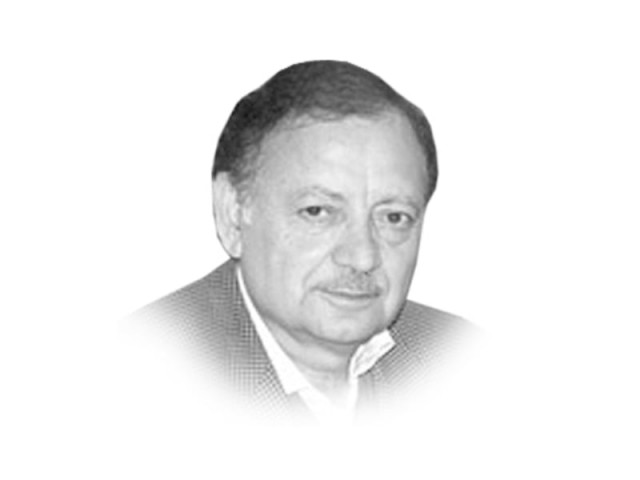Can the establishment change its mind?
Can establishment rethink the role of the political class as a stabilising force, democracy as the only game in town

The establishment has generally not hesitated in sponsoring parties and leaders, especially in the context of elections. This happened not only under military rulers, but also under civilian dispensations. Thus, the establishment has allowed itself to be controversial in terms of its alleged role in playing politics through proxies. On that account, the recent sit-ins in Islamabad pointed to the testing times for the establishment that was dragged into controversy for allegedly supporting Imran Khan and Tahirul Qadri.
Can the establishment have a different perspective, where there are no obvious favourites such as in mature democracies or in India next door? In that case, the links between society by way of its preferences, and the state in terms of its decision-making apparatus, would have been more straightforward and less complicated. But, the general perception for both the Zardari and Nawaz Sharif governments has been that the top brass found them wanting in several respects. This was a recipe for political turmoil.
The least such a situation can do is weaken the government. The most obvious obligation of the security apparatus of any state is to strengthen the government in terms of power, prestige, authority and diplomatic clout with the outside world. Two parallel foci of power operating in the country can only pull the warring factions and groups further apart from each other. In the present context, the agenda of cutting the Nawaz Sharif government to size is tantamount to weakening the writ of the state.
Imagine that Ayub had not changed the parliamentary system into a presidential system against which the whole nation rebelled. Imagine that both Zia and Pervez Musharraf had not sought to undermine parliamentary sovereignty through Article 58(2)(b) and introduced a semi-presidential system. While public representatives twice restored parliamentarism through the 1997 Thirteenth Amendment and the 2010 Eighteenth Amendment, presidentialism still haunts elements in the establishment.
What if the establishment had not opted for Islamisation so strongly from the 1980s onwards? First, the country would not have plunged into sectarian divisions that have served as barriers to national integration. Second, there would not have been the drumming down of the bondage to the state as a territorial, administrative and linguistic entity by those who used the enhanced divine commitment of people as a powerful force to subvert the Constitution.
Third, shying away from a close identification with the Taliban and other jihadi groups would have saved Pakistan from an unenviable profile as a potentially terrorist state in the international community. The country could have been spared this horrible image given the global agenda of anti-terrorism. There have been numerous occasions when somebody apprehended for planning or performing a terrorist activity in a Western country has been traced back to a visit to Pakistan for training. The nation certainly deserved better.
Is the agenda for peace with India doomed forever? It is amazing to see the ability of China and India not to surrender their respective policy positions on their dispute and yet move forward by way of massive bilateral trade. The civilian supremacy over armed forces in both China and India has produced a kind of rapprochement between Beijing and Delhi. If there was civilian supremacy in Pakistan, our security vision would have been in step with regional and global politics.
A cumulative effect of the growing divide between the establishment and society at large is that various sections of the latter are considered less patriotic than others. If you belong to a religious minority — Hindu, Christian or Ahmadi — or to an ethnic minority, such as the Baloch, your credentials as a true Pakistani are far from enviable. If you are a pro-democracy liberal, you are a security threat. If you are an independent journalist, you must prove your muscle in the media war with India. Any exercise in a dispassionate analysis about the official policy raises eyebrows.
Is the establishment anti-intellectual? In a way, all establishments shun that knowledge which is untutored and improperly pipelined. Only in Pakistan, the eerie world of opinion-making has been subjected to ‘guidance’ to an unenviable extent. The school textbooks, the media networks and the institutions of higher learning bear a clear stamp of a thinking that has descended from outside the recognised centres for production of knowledge. Co-option of the intelligentsia remains a cornerstone of intellectual policy.
If the establishment had instilled a sense of confidence in the nation instead of a sense of insecurity, we would have been far less given to conspiratorial nonsense today. If the establishment had given the nation a sense of belonging to the global civilisation instead of a sense of living at its margins, we wouldn’t have been fighting ghosts in the dark all the time. We cannot remain a paranoid state for all times to come. Not surprisingly, the most powerful nations of the world are led by civilian leaderships.
Can the establishment rethink the role of the political class as a stabilising force, democracy as the only game in town, parallel centres of power as disastrous, harbouring terrorists as suicidal, politics of proxies as a recipe for instability, casting aspersions on citizens’ patriotism as undesirable, as well as follow, rather than lead peoples’ aspirations?
Published in The Express Tribune, October 14th, 2014.
Like Opinion & Editorial on Facebook, follow @ETOpEd on Twitter to receive all updates on all our daily pieces.














COMMENTS
Comments are moderated and generally will be posted if they are on-topic and not abusive.
For more information, please see our Comments FAQ